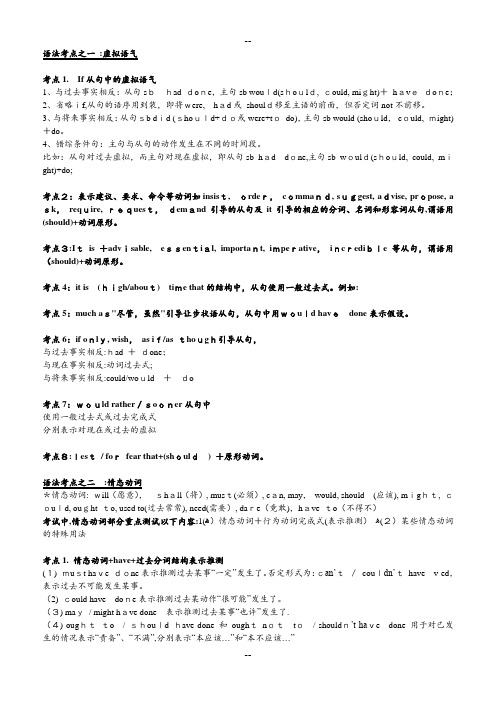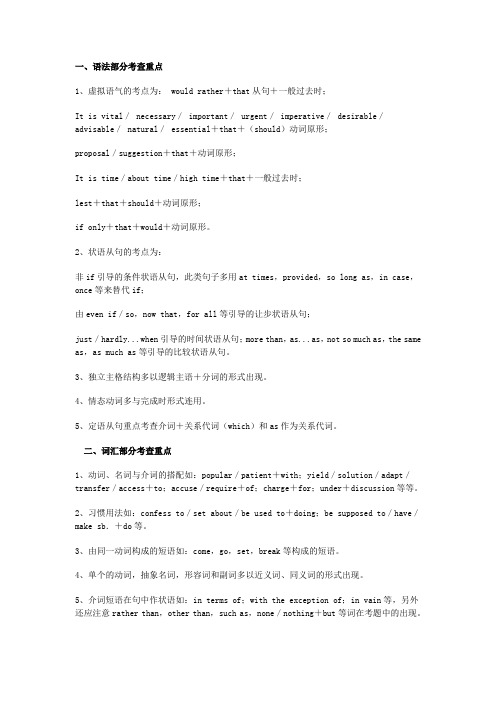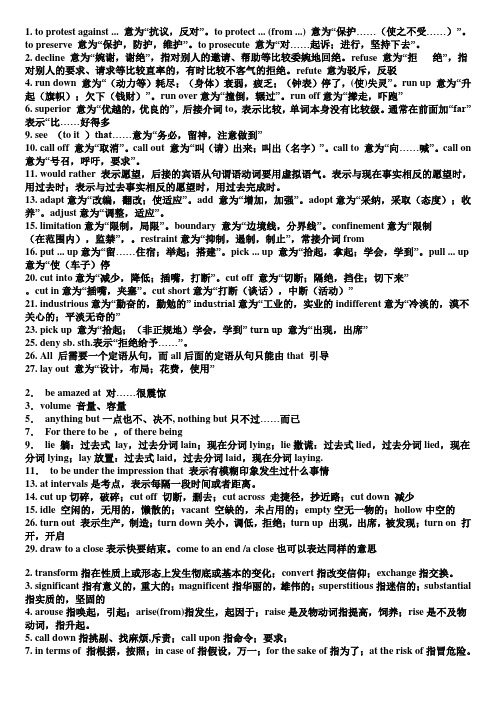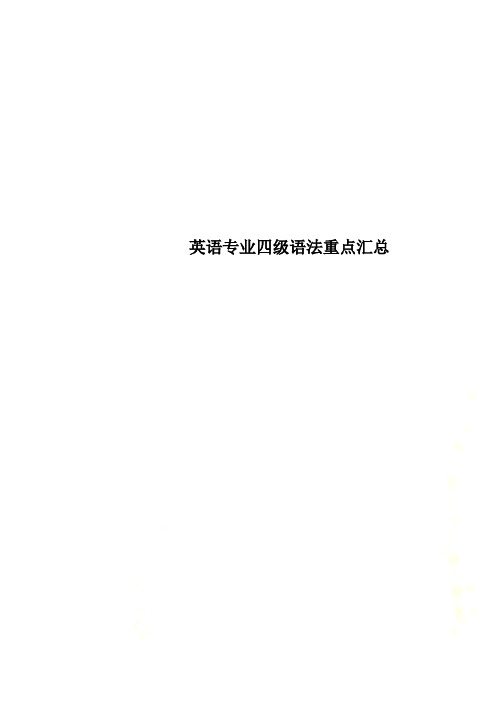英语专业四级语法汇总解析
完整版专四英语语法考点分析解析

语法考点之一:虚拟语气考点1.If从句中的虚拟语气1、与过去事实相反:从句sbhad done,主句sb would(should, could, might)+havedone;2、省略if,从句的语序用到装,即将were,had或should移至主语的前面,但否定词not不前移。
3、与将来事实相反:从句sb did (should+do或were+todo),主句sb would (should,could, might)+do。
4、错综条件句:主句与从句的动作发生在不同的时间段。
比如:从句对过去虚拟,而主句对现在虚拟,即从句sb had done,主句sb would(should, could, might)+do;考点2:表示建议、要求、命令等动词如insist,order,command, suggest, advise, propose, a sk,require, request,demand引导的从句及it引导的相应的分词、名词和形容词从句,谓语用(should)+动词原形。
考点3:Itis +advisable,essential, important, imperative,incredible等从句,谓语用(should)+动词原形。
考点4:it is(high/about)time that的结构中,从句使用一般过去式。
例如:考点5:much as"尽管,虽然"引导让步状语从句,从句中用would havedone表示假设。
考点6:if only, wish,as if/as though引导从句,与过去事实相反:had +done;与现在事实相反:动词过去式;与将来事实相反:could/would+do考点7:would rather/sooner从句中使用一般过去式或过去完成式分别表示对现在或过去的虚拟考点8:lest/ forfear that+(should) +原形动词。
英语专四语法考点总结

一、语法部分考查重点1、虚拟语气的考点为: would rather+that从句+一般过去时;It is vital/ necessary/ important/ urgent/ imperative/ desirable/advisable/ natural/ essential+that+(should)动词原形;proposal/suggestion+that+动词原形;It is time/about time/high time+that+一般过去时;lest+that+should+动词原形;if only+that+would+动词原形。
2、状语从句的考点为:非if引导的条件状语从句,此类句子多用at times,provided,so long as,in case,once等来替代if;由even if/so,now that,for all等引导的让步状语从句;just/hardly...when引导的时间状语从句;more than,as...as,not so much as,the same as,as much as等引导的比较状语从句。
3、独立主格结构多以逻辑主语+分词的形式出现。
4、情态动词多与完成时形式连用。
5、定语从句重点考查介词+关系代词(which)和as作为关系代词。
二、词汇部分考查重点1、动词、名词与介词的搭配如:popular/patient+with;yield/solution/adapt/transfer/access+to;accuse/require+of;charge+for;under+discussion等等。
2、习惯用法如:confess to/set about/be used to+doing;be supposed to/have/make sb.+do等。
3、由同一动词构成的短语如:come,go,set,break等构成的短语。
专业四级词汇语法详细解答40套

Test Twenty Five近义词辨析source, origin, root, resource这组词均含有“打破”或“挤碎”的意思。
source和origin都表示某事的“起源,开端”。
source原指河流的源头,其引申义可用来指某事物的最初来源或出处,在指非物质或无形的事物时尤其如此。
source还常指消息等的“来源,出处”。
origin常译为“起源,发源,起因”,指导致某事物最后出现或形成的因素,或某事物在遥远的空间以外或久远的年代以前的最初形态,常表示某种历史文化现象、风俗习惯的“起源”,有时可译为“起因”。
root的意义是“根源,起因”,它强调导致某事物最终出现的最初的、最根本的、最重要的原因,由此所产生的现象或事物常成为一种外观的产物。
resource主要指一个国家或地区可以取用的“资源,财力,资产”,一般以复数形式出现。
resource 也可指人在处理问题时所表现出的“才智,机敏”,此时resource为不可数名词。
Literature is a source of endless pleasure to many thousands.文学是很多人快乐的无尽源泉。
Do you know the origin of the custom of giving presents at Christmas?你知道在圣诞节互赠礼品这一风俗的来源吗?The root of the question lay in the seizure of the land of Ireland by the English ruling class.这个问题的根源在于英国统治阶级对爱尔兰土地的攫取。
The mortgage is a drain on our financial resources.偿还抵押贷款是我们财务上的一大负担。
ordinary, mediocre, commonplace这组词均含有“平常的,普通的”的意思。
专四语法归纳总结解读

一些搭配与主谓一致
• • • • • • • • a great many + 可数名词复数 many a + 可数名词单数 a number of +可数名词复数 the number of +可数名词复数 the majority of +可数名词复数 neither/either of +可数名词复数 more than one +可数名词单数 one and a half +可数名词复数 谓语用复数 谓语用单数 谓语用复数 谓语用单数 谓语用复数 谓语用单数 谓语用单数 谓语用单数
• 专四中常见的虚拟语气形式。 1) wish后的宾语从句 I wish I knew what was going to happen. 2)suggest (suggestion),propose(proposal),advise (advice)demand, insist, order, request, require, recommend, desire, ask, decide等。在这些从句中,谓语 形式为should加动词原形,should可以省略。 例:The general’s command was that the soldiers _____ their fort and carry out more important task. A. would leave B. leave C. left D. have left (答案:B)(2002年49题) 例:It’s desired that she _____ to teach us at least twice a week. A. comes B. will com C. come D. may come (答案:词作主语主谓一致 1)通常作复数的集体名词 集体名词,如:police, people,cattle,militia民兵,poultry家禽 等, 通常作复数,用复数动词。如: Domestic cattle provide us with milk, beef and hides. 2)通常作不可数名词的集体名词 有些集体名词,如foliage叶 子,machinery,equipment,furniture,merchandise,通常作不可数 名词,随后的动词用单数。例如: All the machinery in the factory is made in China. 3)既可作单数也可作复数的集体名词 集体名词,如audience, committee, class, crew, family, public, government等,既可作单数,也可作复数用。 The city council is meeting to set its agenda. 4)a committee,etc. of +复数名词 如果主语是由“a committee of /a panel of /a board of +复数 名词”构成,随后的动词通常用单数。例如: A committee of five men and three women is to consider the matter.
专四常考语法点汇总

专四常考语法点汇总语法与词汇专项语法核⼼考点⼀:从属分句复合句= 主句+从句(1个或1个以上)要点1从属分句是复合句必不可少的组成部分,以语法功能作为分类标准,从属分句可以分为状语从句、关系从句(即定语从句)和名词性从句。
其中状语从句可分为时间、地点、原因、结果、程度、⽬的、条件、让步和⽅式等;名词性从句可分为主语从句、宾语从句、表语从句、同位语从句。
要点 2 状语从句的考点集中在⽅式、条件、让步、⽅式和时间状语从句上;关系从句的考点集中在关系代词的选择,限制性定语从句和⾮限制性定语从句的区别;名词性从句的考点集中在宾语从句和同位语从句。
⼀状语从句状语从句真题剖析:1 Nine is to three _____ three is to one. (2008, 53)A. whenB. thatC. whichD. what2 ______ he wanted to go out with his friends at the weekend, he had to stay behind to finish his assignment. (2008, 55)A. Much thoughB. Much asC. As muchD. Thouth much3 Men differ from animals ____ they can think and speak. (2008, 54)A. for whichB. for thatC. in thatD. in which4 They stood chatting together as easily and naturally as ____. (2008, 60)A. it could beB. could beC. it wasD. was5 The couple had no sooner got to the station ______ the coach left. (2009,60)A. whenB. asC. untilD. than6 ____ the boss says, it is unreasonable to ask me to work overtime without pay. (2010,55)A. WhateverB. WheneverC. WhicheverD. However7 Fool ____ Jerry is, he could not have done such a thing.A. whoB. asC. likeD. that8 He asked me to lend him some money, which I agreed to do, ___ that he paid me back the following week. (2005)A. on occasionB. on purposeC. on conditionD. only if9 Which of the following contains an adverbial clause of cause?A. I got a job as soon as I left university.B. As there was on answer, I wrote again.C. You must do the exercise as I show you.D. Wealthy as he is, Mark is not a happy man.状语从句重点总结:⼏种不常⽤的条件状语从句举例:In the event that she can not arrive on time, we will go first.Suppose it snowed, we would still go.Say what he said were true, what would you do about it?1. ⼏种不常⽤的让步状语从句举例:In spite of the fact that he was deaf and dumb, he had a genius for music.While the grandparents love the children, they are strict with them.Much as she needed the job, she had to refuse.For all that there were a lot of difficulties, he finally entered the final competition and won.Granted you have made much progress, you should not be conceited.2. ⽤了although或though,就⼀定不能再后⾯的从句中同时⽤but,但是though 可以和yet 连⽤。
专四语法(做完题总结)解读

1. to protest against ... 意为“抗议,反对”。
to protect ... (from ...) 意为“保护……(使之不受……)”。
to preserve 意为“保护,防护,维护”。
to prosecute 意为“对……起诉;进行,坚持下去”。
2. decline 意为“婉谢,谢绝”,指对别人的邀请、帮助等比较委婉地回绝。
refuse 意为“拒绝”,指对别人的要求、请求等比较直率的,有时比较不客气的拒绝。
refute 意为驳斥,反驳4. run down 意为“(动力等)耗尽;(身体)衰弱,疲乏;(钟表)停了,(使)失灵”。
run up 意为“升起(旗帜);欠下(钱财)”。
run over意为“撞倒,辗过”。
run off意为“撵走,吓跑”6. superior 意为“优越的,优良的”,后接介词to,表示比较,单词本身没有比较级。
通常在前面加“far”表示“比……好得多9. see (to it )that……意为“务必,留神,注意做到”10. call off 意为“取消”。
call out 意为“叫(请)出来;叫出(名字)”。
call to 意为“向……喊”。
call on 意为“号召,呼吁,要求”。
11. would rather 表示愿望,后接的宾语从句谓语动词要用虚拟语气。
表示与现在事实相反的愿望时,用过去时;表示与过去事实相反的愿望时,用过去完成时。
13. adapt意为“改编,翻改;使适应”。
add 意为“增加,加强”。
adopt意为“采纳,采取(态度);收养”。
adjust意为“调整,适应”。
15. limitation意为“限制,局限”。
boundary 意为“边境线,分界线”。
confinement意为“限制(在范围内),监禁”,。
restraint意为“抑制,遏制,制止”,常接介词from16. put ... up意为“留……住宿;举起;搭建”。
英语专业四级-词汇、语法详细解答_2

专业四级:词汇、语法详细解答2名词+不定式与名词+介词+ ing分词有些名词如attempt, chance, effort, freedom, intention, reason, necessity, opportunity, time, way 等,在其后用不定式或介词+ ing分词均可,意义无甚区别。
例如:The doctor made a bold attempt to save/at saving the child’s life.有些名词如ability, agreement, ambition, anxiety, curiosity, mind, obligation, permission, refusal, tendency, wish等,在其后通常带不定式,而不带介词+ ing分词。
例如:Our ability to think and speak separates us from other mammals.还有些名词如aptitude, experience, hope, method, possibility, difficulty, interest, plan, habit, passion, genius等,其后通常带介词+ ing分词,而不带不定式。
例如:There is no hope of winning the game.近义词辨析strange, eccentric, odd, peculiar, queer, unique这组词均含有“不平常的”或“奇怪的”的意思。
strange词义最广。
指非一般的、不平常的、费解的或与预期不同的,还强调陌生,不熟悉。
With so many strange faces around her, she felt a bit nervous.身边尽是陌生的面孔,她感到有点紧张。
eccentric指行为偏离常规,特别是显得古怪或可笑。
英语专业四级语法重点汇总

英语专业四级语法重点汇总English英语专八专四学习复习资料英语专四语法重点汇总一、非谓语动词的主要考点1. 有些典型动词后面可以接上不定式或动名词来做宾语的,但是在意思上是有区别的,主要常考到的动词罗列如下:mean to do想要(做某事)VS mean doing意味(做某事)propose to do 打算(做某事)VS propose doing建议(做某事)forget to do忘记(要做的事)VS forget doing忘记(已做的事)remember to do记得(要做某事)VS remember doing记得(做过)go on to do继而(做另一件事)VS go on doing继续(做原来的事)stop to do停下来去做另一件事VS stop doing停止正在做的事regret to do(对将要做的事)遗憾VS regret doing(对已做过的事)后悔2. 不定式的习惯用法典型句型整理如下:如:“cannot help but do”——“不得不做某事”如:“cannot but do”——“不禁做某事”如:“cannot choose but do”——“不由自主地做某事”如:“can do nothing but do”——“不能不做某事”如:“have no choice but to do”——“只能做某事”如:“have no alternative but to do”——“只能做某事”例句:The boy cannot help but be greatly influenced by the useful instruction given by his family tutor.When I start my job career, I cannot choose but look back upon the beautiful days I spent on campus.3. 动名词的习惯用法典型动名词的习惯句型整理罗列如下:如:be busy/active doing sth.如:It’s no good/use doing sth.如:spend/waste time doing sth.如:have difficulty/trouble/problem doing sth.如:have a good/great/wonderful time doing sth.如:There is no point/sense/harm/ use doing sth.例句:There is no use crying over spilt milk.(典型例句)牛奶洒了,哭也没用;后悔是没有用的;覆水难受I really have problem solving these mathematic questions since I am not major in science after all.二、形容词与副词及其比较级1. 形容词的句法功能形容词通常在句子中用做定语、表语与主语的语法成分,通常考到的知识点总结如下:(1) 以“a”开头的形容词如“alone”、“alike”、“asleep”、“awake”等一般不能做前置定语,通常是做表语或后置定语的例句:Jerry didn’t pass the important final exam, please let him alone for the time being.Michael came back from job just now, and his eyes were shut and he seemed to have fallen asleep.(2) 某些以副词词缀“-ly”结尾的词其实是形容词,不能看错是副词,例如“friendly”、“leisurely”、“lovely”等(3) 下列动词既是实义动词又是系动词,注意用做系动词时,要求形容词做表语这些典型单词罗列如下:“remain”、“keep”、“become”、“get”、“grow”、“go”、“come”、“turn”、“stay”、“stand”、“run”、“prove”、“seem”、“appear”、“look”等例句:The situation remains tense between the two countries at this juncture. 在这个节骨眼上,两国形势仍然持续紧张。
- 1、下载文档前请自行甄别文档内容的完整性,平台不提供额外的编辑、内容补充、找答案等附加服务。
- 2、"仅部分预览"的文档,不可在线预览部分如存在完整性等问题,可反馈申请退款(可完整预览的文档不适用该条件!)。
- 3、如文档侵犯您的权益,请联系客服反馈,我们会尽快为您处理(人工客服工作时间:9:00-18:30)。
英语专业四级语法汇总语法回顾篇:专四语法考点虚拟语气、情态动词、非谓语动词、复合句、倒装、小语法(省略,时态,反义疑问句,代词,强调句,主谓一致,冠词,形容词及副词)、as 的特殊用法。
专四英语语法考点串讲之一虚拟语气一般说来,有下列几种考点需要考生注意(十考点及两备考点)考点1. 与现在事实相反从句谓语动词用did (be用were),主句谓语动词would (should, could, might)+do;考点2. 与过去事实相反从句谓语动词用had done,主句谓语动词用would(should, could, might)+ have done;例如:43. I _________the party much more if there hadn’t been quite such a crowd of people there.A. would enjoyB. will have enjoyedC. would have enjoyedD. will be enjoyingKEY: C49. All of us would have enjoyed the party much more if there _________ quite sucha crowd of people there.A. weren’tB. hasn’t beenC. hadn’t beenD. wouldn’t KEY: C考点3.与将来事实相反,从句谓语动词用:did (should + do或were + to do),主句谓语动词用:would (should, could, might)+do。
例如:43. If your car ___ any attention during the first 12 months, take it to an authorized dealer. (08年)• A. shall need B. should need C. would need D. will need KEY: B考点4. 时态的交叉现象,也就是主句与从句的动作发生在不同的时间段例如:If you had gone to see the doctor,you would be all right now.你要是早去看病,你现在就没事了。
考点5. 虚拟条件句if可以省略,但从句的语序要用到装,即将were, had或should移至主语的前面形成倒装,但否定词not不前移。
例如:65.___, he would not have recovered so quickly.(05年)• A. Hadn't he been taken good care of• B. Had he not been taken good care of• C. Had not he been taken good care of• D. Had he been not taken good care of•KEY: B考点6. insist(一个坚持);order, command(两道命令);suggest, advise, propose (三条建议);ask, require, request, demand (四点要求)及相应的名词的从句,谓语要使用:(should)+动词原形或动词原形例如:58. It was recommended that passengers ___ smoke during the flight. (04年)• A. not B. need not C. could not D. would notKEY: A考点7. It is +advisable, essential, important, imperative, incredible等等相关的从句,谓语要使用:(should)+动词原形或动词原形例如:46. It is imperative that students ____ their term papers on time.(04年)• A. hand in B. would hand in• C. have to hand in D. handed in•KEY: A考点8. it is high(about) time that的结构中,从句使用一般过去式例如:54 It’s high time we __ cutting down the rainforests.(06年)A stoppedB had to stopC shall stopD stopKEY: A考点9. much as尽管,虽然,引导让步状语从句,从句中用would have done表示假设,可以使说话人的语气变得十分委婉,真诚。
例如:52. Much as ____, I couldn’t lend him the money because I simply didn’t havethat much spare cash.(99年)A. I would have liked toB. I would like to haveC. I should have to likeD.I should have liked toKEY: A考点10. if only表示要是…就好了相当于wish, as if/as though 的用法。
与现在事实相反:动词过去式与过去事实相反: had + done与将来事实相反:could/would + do例如:52. If only I __play the guitar as well as you! (06 年)A wouldB couldC shouldD might KEY: B备考1. would rather或would sooner后跟宾语从句,从句中使用一般过去式或过去完成式分别表示对现在或过去的虚拟,表示“宁愿某人作某事”例如:The manager would rather his daughter ____ in the same office now.A. had not workedB. not to workC. does not workD. did not workKEY: D备考2.用于lest, for fear that(唯恐,以防)引导的状语从句。
在lest, for fear that 等引导的状语从句中,通常用"(should +)原形动词"这一虚拟语气形式例如:The mad man was put in the soft-padded cell lest he ________ himself.A. injureB. had injuredC. injuredD. would injureKEY: A专四语法考点串讲之二情态动词考试中,情态动词部分重点测试以下内容:(1)情态动词+行为动词完成式(2)某些情态动词的特殊用法1. must have v-edmust have v-ed 表示推测过去某事“一定”发生了。
其否定形式为:can’t / couldn’t have v-ed, 表示过去不可能发生某事。
例如:Since the ditch is full of water, it must have rained last night.2. could have v-ed 表示推测过去某动作“很可能”发生了3. may / might have v-ed 表示推测过去某事“也许”发生了.may 比might 表示的可能性在说话人看来稍大些。
4.ought to / should have v-ed 和ought not to / shouldn’t have v-ed用于对已发生的情况表示“责备”、“不满”,分别表示“本应该…”和“本不应该…”表示应完成而未完成的动作用于完成时中的否定句,表示不应完成但已做的动作5.needn’t have v-ed 表示过去做了某事,但没有做的必要,意为“本没必要…”。
例如:You needn’t have waken me up; I don’t have to go to work today.注意:did not need to do 动作并没发生例:I didn’t need to get up early, so I didn’t get up until 9 a.m.*特殊用法(1) can’t表示“不可能”,may not 表示“不可以”,mustn’t(must not) 表示“不许可,禁止”,needn't (need not) 表示“不必”,dare not +动词原形表示“不敢”(2) must表推测的否定现在式用can’t ,过去式用couldn’t(3) May I / we …?这一类疑问句的肯定回答为Yes, please.或Certainly;否定回答为Please don’t.或No, you mustn’t. 例如:“May we leave now?” “No, you mustn’t. You haven’t finished your home work yet.”(4) need I / we …?这一类疑问句的肯定回答为Yes, we must; 否定回答为needn’t(5)在回答must引起的问题时,如果是否定的答复,不能用mustn’t,而要用needn’t或don’t have to(6)May/might as well may……but….(表转折)(7) I wish to go home with you, may I?(8) Do help yourself to have fruit, won’t you/ will you? (表示一种委婉的请求)*情态动词短语的使用would like to do…would rather do…would rather + 从句would prefer to do...had better do...*情态动词: will(愿意), shall(将), must(必须), can, may, would, should(应该), might, could, ought to, used to(过去常常), need(需要), dare(竟敢),have to(不得不)*dare, need 也可作一般(行为)动词*情态动词一般用法的否定:mustn’t 不准, 禁止,不要can’t(couldn’t) 不会;不能;may (might) not 不可以;needn’t 没必要( = don’t have to )used not/usedn’t to或didn’t use to… 过去不…dare not 不敢*情态动词推测用法Must 一定,肯定can’t (couldn’t) 不可能Can/ could 可能Can’t (couldn’t) 不可能may/ might “可能,也许” May (might) not 也许不,可能不*推断用法should/ought to“按理应当,应该是;shouldn’t 不应该( = ought not to )*情态动词+have +done结构表示对过去动作的推测1.must have done:对过去的肯定推测,译作“一定做了…”,只能用于肯定句中。
